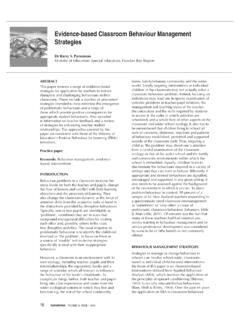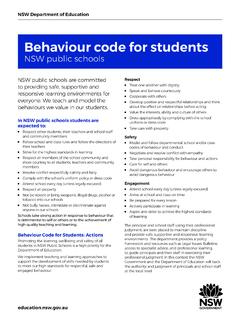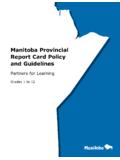Transcription of How Trauma Affects Student Learning and Behaviour …
1 BU Journal of Graduate Studies in Education, Volume 7, Issue 2, 2015 27 How Trauma Affects Student Learning and Behaviour Stephanie Frieze Abstract Each year, more and more students are entering the school system having experienced different forms of Trauma , such as violence, death, abuse, and illness. Children who are exposed to Trauma run the risk of facing negative long-term effects that include mental illness, depression, and anxiety. This literature review provides an overview of how exposure to Trauma Affects children s mental health, as well as Student Learning and Behaviour .
2 Academic performance, school attendance, and overall intelligence are affected by exposure to Trauma . Suggestions for supporting students with Trauma exposure range from everyday interactions to intensive intervention programs, which include traditional and non-traditional practices as well as group and individual programs. Throughout my teaching career, I have observed children entering school with a variety of traumatic experiences that teachers cannot imagine facing themselves. Such experiences may cause students to live in fear and pain, and may also lead them to struggle in areas such as Learning and Behaviour .
3 As a teacher in a school where many of the students have experienced situations such as abuse, violence and loss, it is important for me to educate myself on how to support these students in coping and working through such detrimental experiences. My passion is to make a difference for students and to guide them to reach their always expanding potential. My goal is to learn more about the different effects of Trauma on Student Learning and Behaviour . In order to help students affected by Trauma , I hope to acquire strategies to connect with them, understand their home and community life, and provide guidance for coping with their experiences.
4 I want to provide a supportive environment in which my students feel safe expressing their concerns. As this environment is nourished and sustained, my goal is to work with students to debrief in relation to their experiences and to develop coping strategies. As I become more skilled in supporting students with exposure to Trauma , I would also like to provide ongoing support for other teachers and students division wide. I hope that the information I acquire through my research will help me, and others, to support students with Trauma exposure. My first step in supporting my students is to learn how Trauma exposure Affects mental health.
5 The Effects of Trauma Exposure on Mental Health Trauma exposure includes witnessing and/or being involved in one or more of a broad range of traumatic experiences. Such experiences affect children in many different ways. Some children suffer negative long-term effects from Trauma exposure, often resulting in symptoms of posttraumatic stress disorder (PTSD). These symptoms are similar to the symptoms of people who attended residential schools, for example, because residential school survivors continue to experience negative long-term effects from their experiences. Traumatic events include a vast range of experiences.
6 Jaycox et al. (2009) defined Trauma as a sudden, life threatening event, in which an individual feels horrified, terrified, or helpless (p. 49). While exposure to, and experiences with, violence are detrimental to mental health, violence is only one type of experience that is considered to be traumatic. Duplechain, Reigner, and Packard (2008) considered traumatic events to include hearing gunshots, witnessing muggings, stabbings, or shootings; or seeing a dead body (p. 118). According to Kuban and Steele (2011), traumatic events also include medical procedures, drowning accidents, house fires, car fatalities, substance-abusing parents, divorce, and living with a terminally ill relative (p.)
7 41). Experiences are considered to be traumatic if they happen to the child directly, but also 28 BU Journal of Graduate Studies in Education, Volume 7, Issue 2, 2015 if they happen to their loved ones or to other people around them. These experiences include, but are not limited to, divorce, death, injury, sexual and physical abuse, severe accidents, cancer or life threatening illness, natural or man-made disasters, war, terrorism, physical punishment, female genital mutilation/cutting, child labor, prostitution, pornography, bullying, and suicide (Little, Aiken-Little, & Somerville, 2011).
8 Living in poverty, displacement from homes, and having a parent serving in a war zone are also experiences that are considered to be traumatic for children (Sitler, 2009). Witnessing, or being a victim of, any of the previously mentioned traumatic events can have detrimental effects on children s mental health and well-being. The Diagnostic and Statistical Manual of Mental Disorders (DSM-IV) describes a traumatic experience as a serious threat to a person s physical and/or psychological being (as cited in Duplechain et al., 2008, p. 118). After experiencing Trauma , children often view themselves and the world differently, because they lose their ability to make sense of their experiences (Kuban & Steele, 2011).
9 Not only is their rational thinking altered, but their emotional brain is also affected. Symptoms of Trauma include posttraumatic stress disorder, anxiety problems, depressive symptoms, and dissociation (Jaycox et al., 2009, pp. 49-50). Further effects of Trauma include school drop-out, violence perpetration, internalizing problems ( , posttraumatic stress disorder), alcohol-related problems, and illicit drug use (Zahradnik et al., 2010, p. 409). The most damaging experiences with violence affect a child s microsystem, such as physical and sexual abuse, because they involve violence that is directed at the child (Voith, Gomoske, & Holmes, 2014).
10 Voith et al. (2014) examined both the individual and cumulative effects of the following domains of violence: direct violence, family violence, and neighborhood violence. The results revealed that children with experiences in more than one of the domains displayed greater symptoms of Trauma and depression when compared to those with experiences in only one domain. For example, the symptoms of a Student who has witnessed his/her mother being abused may be less severe than the symptoms of a Student who has been directly physically abused him/herself, because the direct physical abuse Affects the child s microsystem.
















